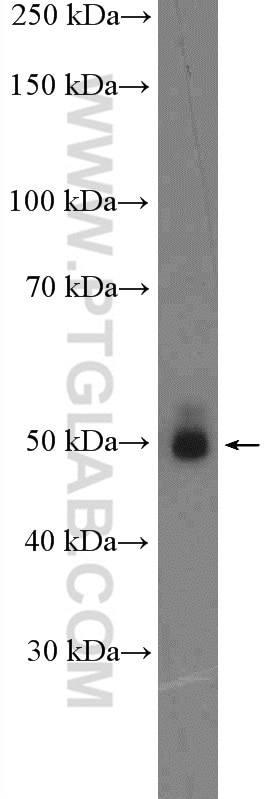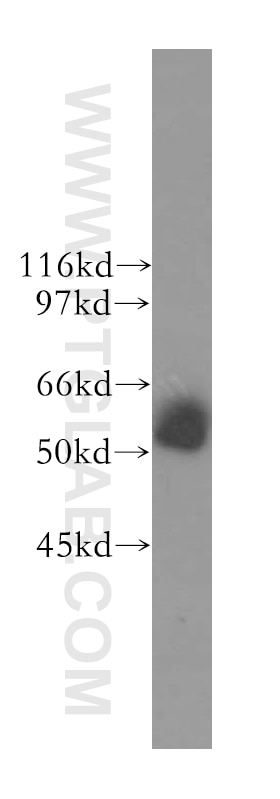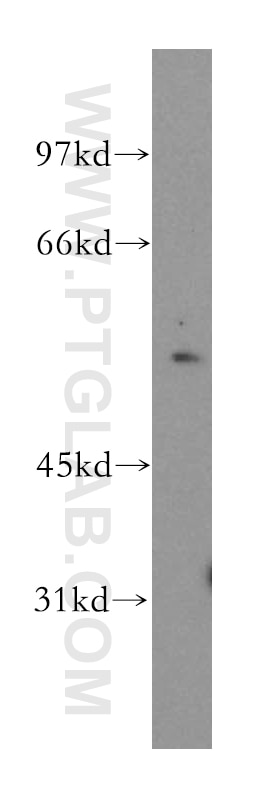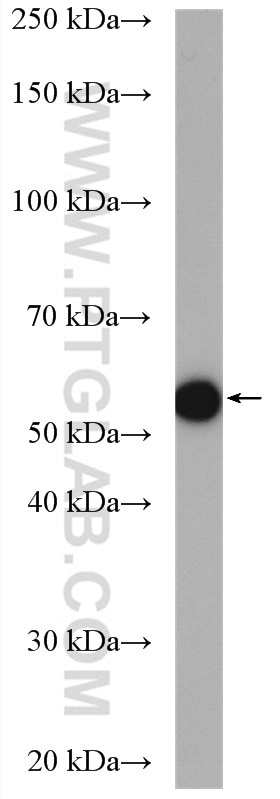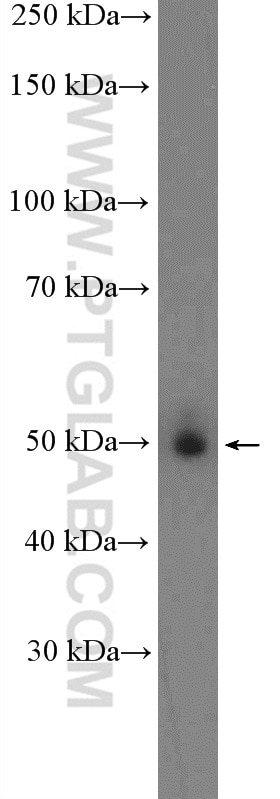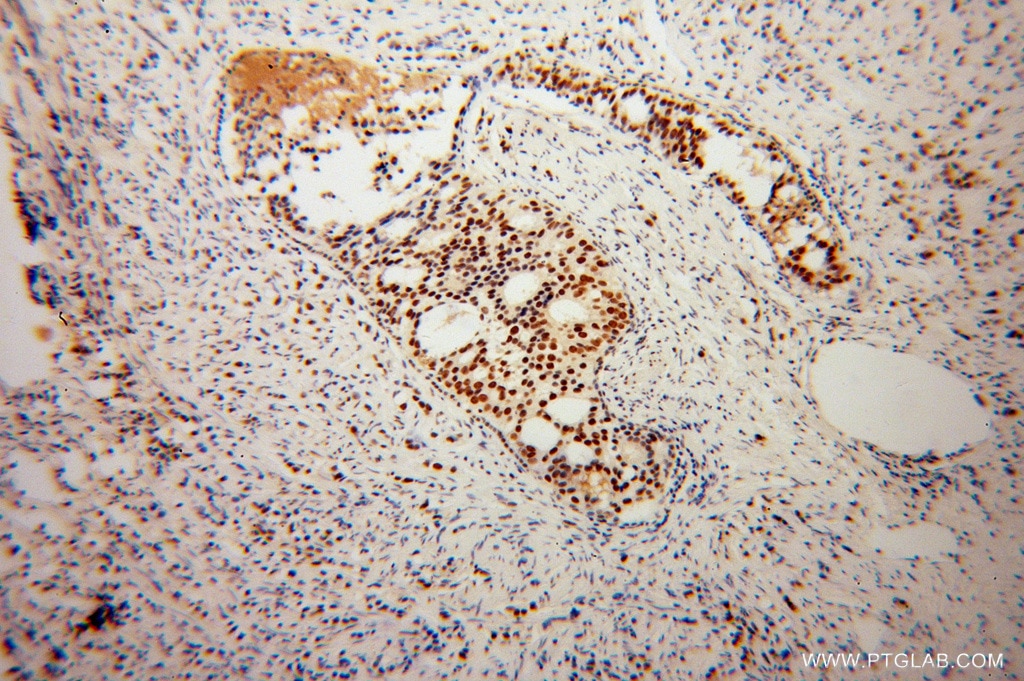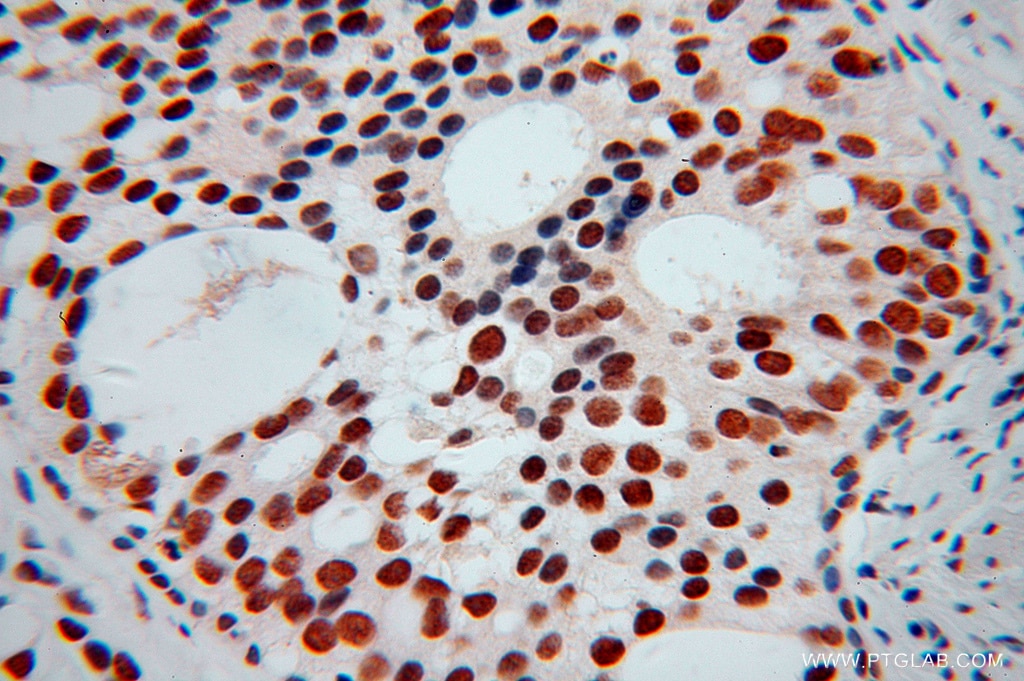- Phare
- Validé par KD/KO
Anticorps Polyclonal de lapin anti-KHDRBS3
KHDRBS3 Polyclonal Antibody for WB, IHC, ELISA
Hôte / Isotype
Lapin / IgG
Réactivité testée
Humain, rat, souris
Applications
WB, IHC, ELISA
Conjugaison
Non conjugué
N° de cat : 13563-1-AP
Synonymes
Galerie de données de validation
Applications testées
| Résultats positifs en WB | tissu cérébral de souris, cellules A549, cellules BGC-823, tissu cérébral humain |
| Résultats positifs en IHC | tissu de gliome humain il est suggéré de démasquer l'antigène avec un tampon de TE buffer pH 9.0; (*) À défaut, 'le démasquage de l'antigène peut être 'effectué avec un tampon citrate pH 6,0. |
Dilution recommandée
| Application | Dilution |
|---|---|
| Western Blot (WB) | WB : 1:2000-1:12000 |
| Immunohistochimie (IHC) | IHC : 1:20-1:200 |
| It is recommended that this reagent should be titrated in each testing system to obtain optimal results. | |
| Sample-dependent, check data in validation data gallery | |
Applications publiées
| KD/KO | See 1 publications below |
| WB | See 2 publications below |
| IHC | See 1 publications below |
Informations sur le produit
13563-1-AP cible KHDRBS3 dans les applications de WB, IHC, ELISA et montre une réactivité avec des échantillons Humain, rat, souris
| Réactivité | Humain, rat, souris |
| Réactivité citée | Humain, souris |
| Hôte / Isotype | Lapin / IgG |
| Clonalité | Polyclonal |
| Type | Anticorps |
| Immunogène | KHDRBS3 Protéine recombinante Ag4438 |
| Nom complet | KH domain containing, RNA binding, signal transduction associated 3 |
| Masse moléculaire calculée | 346 aa, 38, 8 kDa |
| Poids moléculaire observé | 55 kDa |
| Numéro d’acquisition GenBank | BC032606 |
| Symbole du gène | KHDRBS3 |
| Identification du gène (NCBI) | 10656 |
| Conjugaison | Non conjugué |
| Forme | Liquide |
| Méthode de purification | Purification par affinité contre l'antigène |
| Tampon de stockage | PBS avec azoture de sodium à 0,02 % et glycérol à 50 % pH 7,3 |
| Conditions de stockage | Stocker à -20°C. Stable pendant un an après l'expédition. L'aliquotage n'est pas nécessaire pour le stockage à -20oC Les 20ul contiennent 0,1% de BSA. |
Informations générales
KH domain-containing, RNA-binding, signal transduction-associated protein 3 (KHDRBS3, SLM2) is a RNA-binding protein that plays a role in the regulation of alternative splicing and influences mRNA splice site selection and exon inclusion (15901763). May play a role as a negative regulator of cell growth. Inhibits cell proliferation. Involved in splice site selection of vascular endothelial growth factor. Induces an increased concentration-dependent incorporation of exon in CD44 pre-mRNA by direct binding to purine-rich exonic enhancer. RNA-binding abilities are down-regulated by tyrosine kinase PTK6. Involved in post-transcriptional regulation of HIV-1 gene expression (11741900).Ubiquitous with higher expression in testis, skeletal muscle and brain. Expressed in the kidney only in podocytes, the glomerular epithelial cells of the kidney. Strongly expressed after meiosis.This antibody is a rabbit polyclonal antibody raised against a full-length human KHDRBS3 protein.The observed molecular weight of KHDRBS is about 55kd.
Protocole
| Product Specific Protocols | |
|---|---|
| WB protocol for KHDRBS3 antibody 13563-1-AP | Download protocol |
| IHC protocol for KHDRBS3 antibody 13563-1-AP | Download protocol |
| Standard Protocols | |
|---|---|
| Click here to view our Standard Protocols |
Publications
| Species | Application | Title |
|---|---|---|
Acta Neuropathol Transportin 1 accumulates specifically with FET proteins but no other transportin cargos in FTLD-FUS and is absent in FUS inclusions in ALS with FUS mutations. | ||
PLoS Genet The tissue-specific RNA binding protein T-STAR controls regional splicing patterns of neurexin pre-mRNAs in the brain. | ||
Cell Death Dis KHDRBS3 regulates the permeability of blood-tumor barrier via cDENND4C/miR-577 axis.
|
